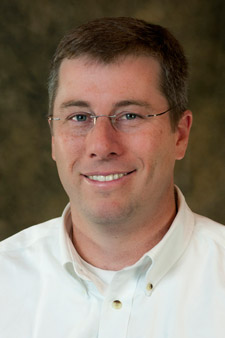Faculty Member Presents Sessions for Teachers, Anthropologists
Friday, April 13, 2012
 A faculty member in the School of Integrated Studies at Pennsylvania College of Technology was a presenter at two recent conferences.
A faculty member in the School of Integrated Studies at Pennsylvania College of Technology was a presenter at two recent conferences.D. Robert Cooley, assistant professor of anthropology/environmental science, presented on March 24 at the Penn State Symposium for Teaching and Learning With Technology and on March 29 at the annual meeting of the Society for Applied Anthropology in Baltimore.
At the Symposium for Teaching and Learning With Technology, Cooley presented "From the Classroom to the Field: Using Rich Media and ANGEL to Bring Real-World Examples I nto the Classroom." Cooley discussed how he teamed with Penn College's Office of Instructional Technology to develop a rich-media content package, as well as a series of virtual video field trips, creating a more active learning experience for his Environmental Science classes.
The virtual field trip video series, "In the Field," takes Cooley into the field to highlight a specific course topic with local significance. Used in both distance-learning and face-to-face class formats, students have responded positively to the series.
The Penn State Symposium for Teaching and Learning With Technology is an annual one-day event to showcase ways that technology can be used to enhance teaching, learning and research. The intent is to give faculty the opportunity to share how they are using technology in unique ways, network with other colleagues, and generate new project ideas.
At the Society for Applied Anthropology annual meeting, Cooley presented a session titled "The New Frontier: Cultural and Ecological Impacts of the Marcellus Shale Gas Rush in North Central Pennsylvania."
His research is an anthropological analysis of the cultural dimensions of the Marcellus Shale gas play in northcentral Pennsylvania.
The region's rural communities and vast state lands are experiencing a "gold rush" that has proponents and critics alike. Cooley's paper focuses on Lycoming County and examines the significant demographic and cultural changes in communities now home to the drilling companies and their personnel.
The Society for Applied Anthropology aspires to promote the integration of anthropological perspectives and methods in solving human problems throughout the world, to advocate for fair and just public policy based upon sound research, to promote public recognition of anthropology as a profession, and to support the continuing professionalization of the field.
Cooley is department head for social sciences and humanities at Penn College. He holds a doctorate in ecological anthropology from the University of Georgia and a bachelor's degree in biology from Bucknell University. He has been employed by Penn College since 2003.
To learn more about academic offerings in the School of Integrated Studies at Penn College, call 570-327-4521 or visit online .
For general information about the college, visit on the Web , email or call toll-free 800-367-9222.
